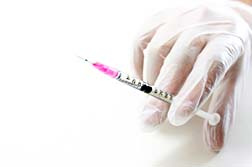 Since news surfaced of the FDA sending federal agents to seize about two pounds of suspect heparin from the Celsus facility in Ohio, it has been learned that the manufacturer had sourced raw heparin from Changzhou SPL, the facility in China that has been linked to heparin contamination since the story first broke in January. Changzhou SPL, which is owned by an American-based company, has been implicated as the primary pipeline for tainted raw heparin sold to a number of manufacturers, including Celsus Laboratories.
Since news surfaced of the FDA sending federal agents to seize about two pounds of suspect heparin from the Celsus facility in Ohio, it has been learned that the manufacturer had sourced raw heparin from Changzhou SPL, the facility in China that has been linked to heparin contamination since the story first broke in January. Changzhou SPL, which is owned by an American-based company, has been implicated as the primary pipeline for tainted raw heparin sold to a number of manufacturers, including Celsus Laboratories.Heparin is fashioned from the intestines of swine, and raw heparin is more often than not produced in small, family-run cookhouses scattered throughout China. While it has not been determined how oversulfated chondroitin sulfate got into the heparin, authorities and regulators are working on the hypothesis that the heparin mimic was added in an effort to flesh out perceived heparin levels with an eye to higher profits by unknown agents supplying raw heparin to Changzhou SPL.
In the ensuing months immediately following the massive heparin recall last January, the FDA inspected the Celsus facility in April and found two of its heparin products contaminated: heparin sodium, and heparin lithium. The latter is used to coat medical devices, such as blood collection tubes, in an effort to keep blood from clotting on, and within the tubes. A total of 31 pounds of heparin lithium was seized, whereas 2 pounds of heparin sodium, which is administered directly to patients as a blood thinner, was grabbed by the agents under FDA direction.
However, it should be noted that the 33 pounds of product represented only a fraction of the full 11 lots that were at issue, much of which had been shipped to other manufacturers by Celsus.
Once the heparin contamination was known, Celsus sent a letter to its various customers, with a warning that the heparin was contaminated. However, the FDA had asked the company to go one step further and physically recall the product from their clients, given the seriousness of the issue, and the danger presented to heparin patients.
When Celsus failed to comply, the FDA reportedly sent a follow-up letter on May 8th, repeating its request for a complete and physical recall. When that didn't happen, the FDA decided to act.
It is not clear, given the concern, why the FDA did not attempt to seize the contaminated lots of heparin from the various Celsus clients, after Celsus failed to comply. Celsus had, after all, notified its various customers of the contamination. When Celsus failed to comply with the recall order, the FDA notified the various Celsus clientele on its own about the contaminated product—in effect, repeating the step that Celsus had already taken.
READ MORE HEPARIN LEGAL NEWS
Thankfully, the contaminated heparin was never used and no patients were put at risk, according to an FDA spokesperson.
However, questions remain with regard to a manufacturer's response to heparin contamination, and to patients requiring heparin injection with heparin syringes. Why was a physical recall by Celsus unpalatable by the company? And why did the FDA physically seize tainted product from Celsus, but not from its' customers?
The pharmaceutical world works in mysterious ways sometimes. Hopefully, no more patients will be sickened, or die in the course of those mysteries being unraveled.
